| Srl | Item |
| 1 |
ID:
147630
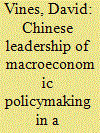

|
|
|
|
|
| Summary/Abstract |
This paper discusses the kind of leadership in global macroeconomic policymaking that China might provide. The paper describes a form of leadership, which I call ‘concerted unilateralism’, that enables countries to pursue their own objectives, in a way which they would not have been able to do if they were acting on their own, and enables them to achieve a higher level of welfare. I contrast such leadership this with a form of authoritarian leadership in which the leader imposes obligations on other countries which are to the disadvantage of those countries. I argue that China could provide leadership of the first kind, by making use of the G20 Mutual Assessment Process, or G20MAP. In the short term, China might do this by consolidating the ‘2-in-5’ action plan, which Australia instituted within the G20MAP when it was Australia was President of the G20. In the longer term, China might do this by ensuring that there is convergence between the G20MAP and China's own One-Belt-One-Road strategy for international engagement in trade and finance.
|
|
|
|
|
|
|
|
|
|
|
|
|
|
|
|
| 2 |
ID:
111774
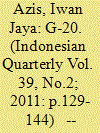

|
|
|
| 3 |
ID:
098769


|
|
|
| 4 |
ID:
096971
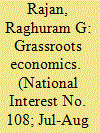

|
|
|
| 5 |
ID:
128772
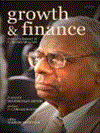

|
|
|
|
|
| Publication |
New Delhi, Academic Foundation, 2011.
|
| Description |
336p.Hbk
|
| Standard Number |
9788171888665
|
|
|
|
|
|
|
|
|
|
|
|
Copies: C:1/I:0,R:0,Q:0
Circulation
| Accession# | Call# | Current Location | Status | Policy | Location |
| 057620 | 338.954/KOC 057620 | Main | On Shelf | General | |
|
|
|
|
| 6 |
ID:
086393
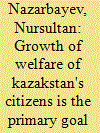

|
|
|
|
|
| Publication |
2008.
|
| Summary/Abstract |
Kazakhstan entered 2008 with new economic achievements and a significantly modernized political structure. New amendments to the Constitution enhanced the role of the Parliament and political parties, the institutions of the civil society.
|
|
|
|
|
|
|
|
|
|
|
|
|
|
|
|
| 7 |
ID:
137595
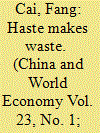

|
|
|
|
|
| Summary/Abstract |
This paper provides a framework for assessing the health of China's macro economy and the sustainability of economic growth by combining supply-side and demand-side factors and by considering their relationship at different stages of development. As the Chinese economy passed through its Lewis turning point, weakened supply-side factors caused its growth to slow. The increasing concern regarding the economic slowdown has induced both the central and local governments to implement various stimulus plans through instruments of macroeconomic, industrial and regional policies. By examining where the imbalances of the Chinese economy really lie and investigating the determinants of the current slowdown and of the enhancement of the potential growth rate, the present paper suggests that the best path of action for the Chinese Government is not to stimulate growth through demand-side factors but to increase the potential growth rate through reforms in certain key areas.
|
|
|
|
|
|
|
|
|
|
|
|
|
|
|
|
| 8 |
ID:
100546
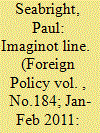

|
|
|
| 9 |
ID:
172368


|
|
|
|
|
| Summary/Abstract |
Indonesia fielded shocks due to the Asian Financial Crisis (AFC) and the Global Financial Crisis (GFC) quite differently. Financial contagion, policy misdirection, panic and political upheaval saw the AFC bring economic collapse. The GFC, however, brought about real domestic growth of 6.1 per cent (2008) and 4.5 per cent (2009)—amongst the world’s best performances at the time. This paper reviews these events and employs numerical modelling of stylized AFC and GFC shocks to show that some of the contrast stems from differences in the shocks and intervening changes in Indonesia’s economic structure. Critically, IMF conditionality during the AFC required unsustainably contractionary reforms. Capital flight elements were present in both crises, however, and exchange rate depreciations and money-financed fiscal expansions are shown to have contributed significantly to resolution.
|
|
|
|
|
|
|
|
|
|
|
|
|
|
|
|
| 10 |
ID:
123625
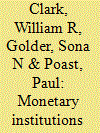

|
|
|
|
|
| Publication |
2013.
|
| Summary/Abstract |
According to the political business cycle literature, survival-maximizing leaders will manipulate whatever macroeconomic policy instruments they have at their disposal in order to retain power. However, an obvious implication of the political business cycle literature has not previously been adequately tested: does having the ability to manipulate macroeconomic policy instruments actually allow leaders to stay in office longer? We argue that elected leaders who have neither fiscal nor monetary instruments available for electoral purposes will find it more difficult to survive in office. We test this claim using data from 19 OECD countries in the latter part of the twentieth century when the degree of capital mobility in the international economy was high. We find that access to macroeconomic instruments does help leaders retain office, but that these instruments are only effective for leaders who have been in office for at least 7 years.
|
|
|
|
|
|
|
|
|
|
|
|
|
|
|
|
| 11 |
ID:
097906


|
|
|
|
|
| Publication |
2010.
|
| Summary/Abstract |
Recent explanations of transformations of macroeconomic policy under crisis conditions spotlight the intrinsic properties of ideas and the persuasiveness with which they are marketed. Bridging the divide between power and discourse approaches, this article reveals the causal role played by the power resources of expert ideational entrepreneurs, conditional on the political conjuncture in which they operate. The authors exploit a fortuitous natural experiment from the early 1980s, when the Israeli economy spiraled into hyperinflation. Two similar proposals for economic stabilization and reform were offered by different teams of economists, less than two years apart. While the government rejected the dollarization plan, its authorization of the stabilization plan inaugurated a new political-economic regime. This case, in which similar programs were advocated by different ideational entrepreneurs in a largely stable institutional and economic context, makes it possible to pinpoint why radically new ideas succeed or fail. Previously underutilized analytical tools are employed to conceptualize the power of idea carriers, at both the individual and the group level.
|
|
|
|
|
|
|
|
|
|
|
|
|
|
|
|
| 12 |
ID:
051542
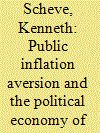

|
|
|
| 13 |
ID:
112809
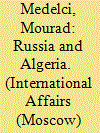

|
|
|
|
|
| Publication |
2012.
|
| Summary/Abstract |
Let me first of all express my gratitude to you for the honor you have granted me to address this distinguished forum of the "International Affairs" magazine. I present our appreciation for the quality and depth of your research and analysis so informative and relevant in a rapidly changing and sometimes uncertain international context
|
|
|
|
|
|
|
|
|
|
|
|
|
|
|
|
| 14 |
ID:
043827
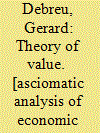

|
|
|
|
|
| Publication |
New Haven, Yale University Press, 1959.
|
| Description |
xi, var.Pagination
|
| Series |
Cowles Foundation Monograph
|
| Standard Number |
0300015585
|
|
|
|
|
|
|
|
|
|
|
|
Copies: C:1/I:0,R:0,Q:0
Circulation
| Accession# | Call# | Current Location | Status | Policy | Location |
| 010310 | 339.5/DEB 010310 | Main | On Shelf | General | |
|
|
|
|
| 15 |
ID:
147335
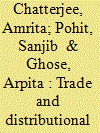

|
|
|
|
|
| Summary/Abstract |
Against the background of declining agricultural productivity and a large population, genetically modified (GM) crops could play a key role in India. The current article uses a modified GTAP model to study empirically the overall impacts of the adoption of GM cotton, soybean, maize and rice on various sectors of the Indian economy through computable general equilibrium analysis. The impacts of a compulsory labelling policy and positive and negative preference shifts towards GM rice by Indian consumers are also analysed along with the effects on income distribution. The results indicate that productivity improvements from GM technology adoption in India have a significant positive impact on India’s production, trade and welfare. Even a possible ban on the import of GM rice from India by European Union (EU) will not have any negative welfare impact on Indian consumers, though the export of Indian rice will be much lower.
|
|
|
|
|
|
|
|
|
|
|
|
|
|
|
|
| 16 |
ID:
100268
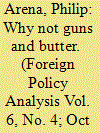

|
|
|
|
|
| Publication |
2010.
|
| Summary/Abstract |
Diversionary approaches rarely explain why leaders use force in response to economic turmoil rather than addressing the problem directly. Those few studies that do address this often assume leaders can either respond with foreign policy or economic policy, but not both. I develop a formal model in which governments may employ macroeconomic policy tools, enter into an international crisis, or both. The results indicate that the relationship between economic conditions and the decision to use force may be either positive or negative. I discuss the implications with respect to recent empirical studies of the link between economic conditions and international conflict.
|
|
|
|
|
|
|
|
|
|
|
|
|
|
|
|